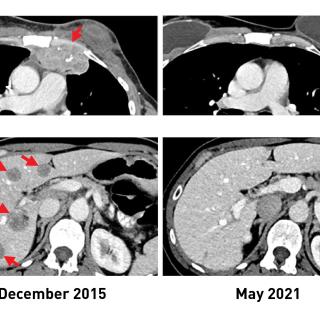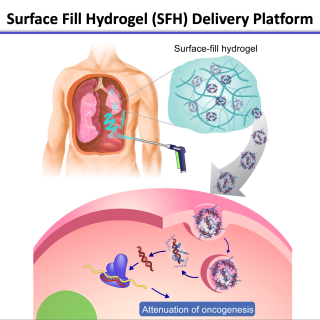Our Discoveries
NCI study advances personalized immunotherapy for metastatic breast cancer
An experimental form of immunotherapy that uses an individual’s own tumor-fighting immune cells could potentially be used to treat people with metastatic breast cancer, according to results from an ongoing clinical trial led by Steven A. Rosenberg, M.D., Ph.D., Chief of the Surgery Branch.
Read MoreResearchers develop new method to estimate cell-type-specific information from bulk tumor data
CCR researchers have established a way to extract cell-type-specific expression information from bulk gene expression data of a tumor sample. Their computational approach, which outperforms comparable state-of-the-art methods, evaluates thousands of tumor samples with minimal cost.
Read MoreBreast cancer stem cells become aggressive upon contact with macrophages
New findings suggest that breast cancer cells gain stem-like characteristics of invasiveness, aggressiveness and drug resistance upon contact with macrophages, specialized white blood cells in the immune system.
Read MoreA high-fiber diet may improve the response of melanoma patients to immunotherapy
A new study co-led by Giorgio Trinchieri, M.D., chief of the Laboratory of Integrative Cancer Immunology, found that a diet rich in fiber may help some people being treated for melanoma respond to immunotherapy treatment by influencing the gut microbiome. The new findings come from an analysis of people with melanoma and mouse models of the disease.
Read MoreCell surface molecule could predict how patients respond to immunotherapy
A new study finds that some immunotherapy drugs are less likely to control cancer in patients who carry HLA-A*03, a cell surface molecule that is involved in immune system responses. This work, which was featured in NCI's Cancer Currents, reveals that HLA-A*03 is a potential biomarker for patient prognosis following certain immunotherapy treatments.
Read MoreCCR researchers use immunogenetic profiling to identify targets for numerous pediatric cancers
Researchers analyzed over 700 pediatric tumor samples and cell lines, creating one of the largest profile datasets of gene expression and immune response in solid pediatric tumors to date. Their work reveals that a germline developmental protein called PRAME is a potential cancer target.
Read MoreIbrutinib improves survival for younger people with diffuse large B-cell lymphoma
New evidence suggests that adding the drug ibrutinib to a standard chemotherapy regimen can improve how long some younger people with a specific form of diffuse large B-cell lymphoma live. The findings come from a new analysis led by Louis M. Staudt, M.D., Ph.D., Chief of the Lymphoid Malignancies Branch, of a previous phase III clinical trial.
Read MoreGut bacteria sculpt innate immunity within the tumor microenvironment
New research reveals how gut bacteria reprogram innate immune cells to activate and recruit cells important for anti-cancer immunity, keeping tumor growth in check and improving the response to cancer immunotherapy.
Read MoreNew tool helps researchers make sense of complex immune signals
Drawing on thousands of prior studies, CCR scientists have developed a computational tool that helps predict how immune cells’ molecular communications impact cancer, infection control and inflammatory disease.
Read MoreNewly developed gel can be used to treat cancers that form on organ surfaces
Researchers at CCR engineered a hydrogel carrying nanoparticles that can be sprayed or administered by syringe as part of a surgical strategy for cancers that develop on the outer surface of organs. When applied topically, the gel can reach small deposits of cancer cells that might have been missed during surgery. This approach has the potential to change the treatment paradigm for mesothelioma and possibly for other cancers that form on the surface of organs.
Read More








